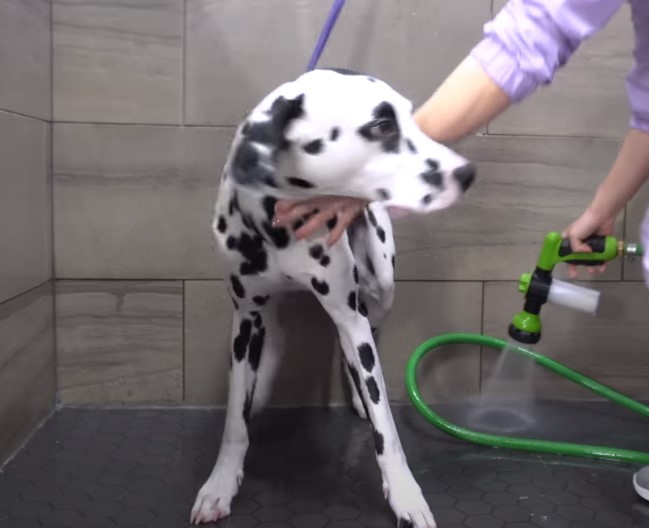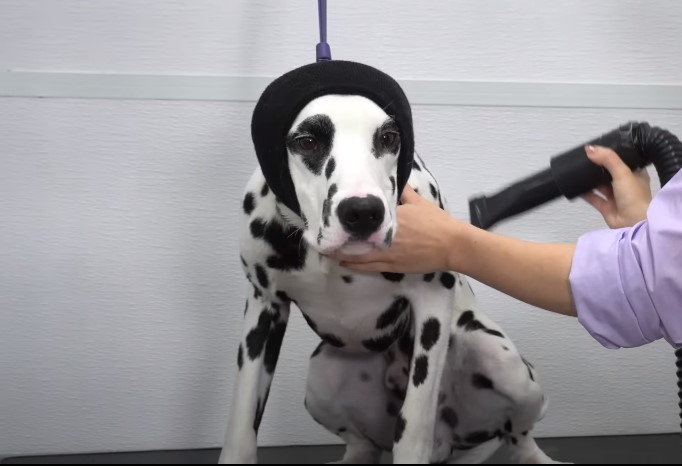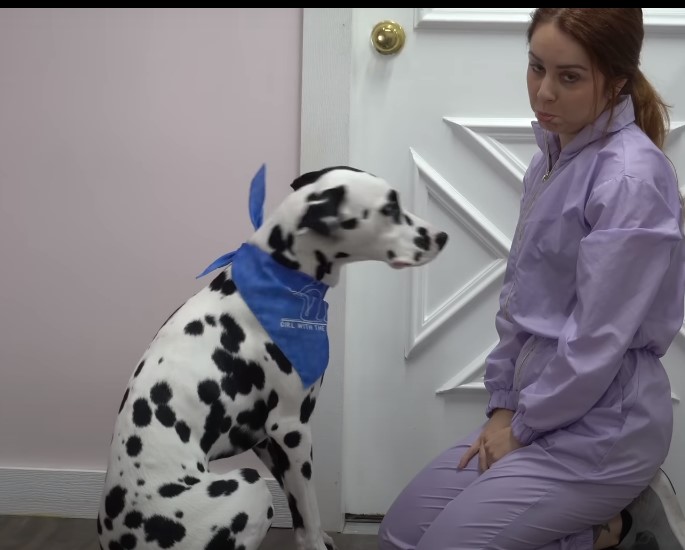Dalmatians are not good family dogs due to their high energy levels and tendency towards aggressive behavior. Dalmatians may not be the best choice for families looking for a calm and gentle companion.
With their energetic nature, they require ample exercise and mental stimulation to prevent boredom, which can lead to destructive behavior.
Additionally, their assertive nature may cause them to be too rough or dominant with young children, especially if not properly trained and socialized.
While every dog is unique and individual temperaments can vary, potential owners should consider these factors before bringing a Dalmatian into a family environment.
Proper training, socialization, and an active lifestyle can help mitigate some of these issues and make Dalmatians more suitable as family pets.
Why Are Dalmatians Not Good Family Dogs
Dalmatians, with their striking appearance and association with the popular “101 Dalmatians” franchise, may seem like an ideal family pet.
However, prospective dog owners should be aware of certain characteristics that make Dalmatians less suitable for some families.
Firstly, their high energy levels and need for regular exercise can be demanding for busy households.
Additionally, Dalmatians can be independent and stubborn, making training a challenge.
They may not always tolerate rough handling from young children.
Moreover, some Dalmatians are prone to anxiety and may not cope well with chaotic family environments.
Responsible pet ownership includes thorough research and understanding a breed’s suitability for your family’s lifestyle.
Dalmatians’ High Energy Levels
Understanding The Energetic Nature Of Dalmatians
Dalmatians are well-known for their high energy levels, which can be both a blessing and a challenge for potential owners. Understanding the energetic nature of Dalmatians is crucial when considering them as family pets. Here are some key points to keep in mind:
- Hyperactivity: Dalmatians are extremely active dogs that require a lot of physical exercise to keep them happy and healthy.
- High exercise needs: These dogs have a lot of stamina and need daily activities that go beyond just a short walk around the block.
- Enthusiasm for play: Dalmatians are known for their love of playtime, whether it’s a game of fetch, agility training, or participating in canine sports.
The Challenges Of Meeting Their Exercise Needs
Maintaining a Dalmatian’s exercise routine can present challenges, especially for families with busy schedules. Here are a few things to consider:
- Time commitment: Dalmatians require a significant amount of exercise each day, which can be difficult to manage for families who have limited free time.
- Outdoor space: Living in an apartment or having a small yard can make it challenging to meet a Dalmatian’s exercise requirements.
- Leash manners: Dalmatians are known to be strong-willed and may require extra training to walk calmly on a leash.
The Implications For Families With Busy Schedules
For families with busy schedules, owning a Dalmatian can be a demanding task. Here’s what you need to know:
- Neglected exercise needs: If a Dalmatian’s exercise needs are not adequately met, they can become bored and restless, leading to behavioral issues like excessive barking, destructive chewing, or even aggression.
- Need for mental stimulation: Along with physical exercise, Dalmatians require mental stimulation to keep their active minds engaged. This can include puzzle toys, obedience training, or interactive games.
- Considerations for working families: If both parents work full-time or if the family is frequently away from home, it may be challenging to provide the necessary exercise and attention that a Dalmatian requires.
Dalmatians can make loving and loyal family pets, but their high energy levels and exercise requirements must be taken into account.
Families considering a Dalmatian should be prepared to devote ample time and effort to ensure their furry friend remains happy and fulfilled.
Dalmatians’ High Prey Drive
Exploring The Inherent Hunting Instinct In Dalmatians
Dalmatians are renowned for their striking looks and energetic personalities. However, their high prey drive is a characteristic that potential owners need to consider before bringing one into their family.

This innate hunting instinct can present challenges, particularly in households with small children or other pets.
It’s important to understand the potential risks and learn effective strategies for managing and channeling a Dalmatian’s prey drive.
The Potential Risks For Families With Small Children Or Other Pets
While Dalmatians are generally friendly and affectionate dogs, their strong prey drive can create potential risks for households with small children or other pets. Here are some key points to consider:
- Dalmatians have a natural instinct to chase small, quick-moving objects. This can include children running or playing, which may lead to accidental knocks or injuries.
- Due to their hunting heritage, Dalmatians may see smaller pets, such as cats or small dogs, as prey. Without proper training and socialization, conflicts can arise, putting other pets at risk.
- Dalmatians tend to have a high energy level, which can be overwhelming for young children or other pets who may not be able to keep up or handle the rough play.
To ensure the safety of both your family and your Dalmatian, it’s important to take measures to manage their prey drive and create a harmonious environment.
Effective Ways To Manage And Channel Their Prey Drive
Managing a Dalmatian’s prey drive requires careful training and structured activities to redirect their instincts. Here are some effective strategies to consider:
- Early socialization is crucial. Expose your Dalmatian to a variety of people, animals, and situations from a young age to help them learn appropriate behavior and reduce the risk of aggression towards other pets or children.
- Incorporate obedience training into their daily routine. Teaching basic commands such as “sit,” “stay,” and “leave it” will enhance their impulse control and help redirect their focus away from potential prey.
- Provide mental and physical stimulation. Engage your Dalmatian in activities such as puzzle toys, scent games, and vigorous exercise to tire them out and decrease their prey drive.
- Consider using positive reinforcement techniques. Reward good behavior with treats or praise, and avoid punishment-based training methods, which can exacerbate anxiety and aggression.
- Seek professional help if needed. If you’re struggling to manage your Dalmatian’s prey drive or resolve conflicts within the household, consult a certified dog trainer or behaviorist who specializes in working with high-energy breeds.
By understanding and addressing a Dalmatian’s high prey drive, you can ensure a safe and happy environment for both your family and your beloved four-legged friend.
With the right approach, you can help your Dalmatian thrive and fully embrace their unique characteristics while minimizing any potential risks.
Dalmatians’ Need For Socialization And Training
Dalmatians are often admired for their distinctive spots and energetic personalities, but they may not be the ideal choice for every family. One of the key factors that sets Dalmatians apart as a breed is their need for early socialization and training.
Here, we’ll explore the importance of socializing Dalmatians from an early age, as well as the challenges that can arise when training these independent-minded dogs. For families who lack the time or experience to meet these needs, it’s important to consider the potential implications before bringing a Dalmatian into the household.
Let’s delve into this further.
The Importance Of Early Socialization For Dalmatians:
- Dalmatians are naturally friendly and social dogs, but they require proper socialization to ensure they develop into well-adjusted adults.
- Early socialization helps them become comfortable with various people, animals, and environments which can prevent behavioral issues later in life.
- By introducing them to different sights, sounds, and experiences, you can help your Dalmatian become a confident and well-behaved companion.
The Challenges Of Training Due To Their Independent Nature:
- Dalmatians are known for their independent streak, which can make training somewhat challenging.
- They have a strong instinct to follow their own interests, so consistent and patient training methods are necessary.
- Dalmatians respond best to positive reinforcement techniques and need clear boundaries to understand what is expected of them.
The Potential Implications For Families Lacking Time Or Experience:
- Training and socializing a Dalmatian can be time-consuming and requires consistency and dedication.
- Families with busy schedules or limited experience may struggle to provide the necessary training and socialization.
- Without proper attention to these needs, Dalmatians may develop behavioral issues such as aggression, anxiety, or destructive tendencies.
Considering the unique needs of Dalmatians when it comes to socialization and training is crucial before deciding if they are the right fit for your family.

Investing time, effort, and resources into their development will result in a well-rounded and happy Dalmatian that can thrive in a family environment.
However, it’s essential to recognize the potential challenges and make sure you have the means to meet these needs before bringing a Dalmatian into your home.
Dalmatians’ Sensitivity And Nervousness
Dalmatians are an iconic breed known for their distinctive spotted coat and lovable appearance. However, it’s important to understand that Dalmatians have unique personality traits that may not make them the best fit for every family. One characteristic that stands out is their sensitivity and nervousness.
Let’s delve into this aspect and explore why Dalmatians might not be the ideal choice for a family dog.
Discussing The Breed’S Sensitivity To Stimuli And Sensitivity To Stress:
- Dalmatians are highly sensitive dogs and can easily become overwhelmed by various stimuli in their environment.
- Loud noises such as thunderstorms, fireworks, or even household appliances can cause significant stress and anxiety in Dalmatians.
- Even seemingly minor changes in routine or unfamiliar situations can trigger their sensitive nature, leading to fear or nervousness.
The Potential Impact On Families With Young Children Or A Hectic Household:
- Dalmatians’ sensitivity can pose a challenge for families with young children, as their exuberant energy and unpredictable behavior might unintentionally overwhelm the dog.
- Dalmatians may find it difficult to cope with the noise and chaos that often comes with a bustling household, which can lead to increased anxiety and stress for both the dog and the family.
- Their nervous disposition may make it challenging for them to adapt to new routines or handle the constant activity and demands of a busy family life.
Helpful Tips For Creating A Calm And Comfortable Environment For Dalmatians:
- Establishing a consistent routine can provide a sense of security for Dalmatians, helping to minimize their sensitivity and nervousness.
- Providing a dedicated space, like a quiet room or cozy corner, where your Dalmatian can retreat to when they feel overwhelmed can be beneficial.
- Implement positive reinforcement training techniques to boost their confidence and help them better cope with stressful situations.
- Gradually introduce them to new experiences and stimuli, using desensitization and counterconditioning methods, to help them build resilience and adaptability.
Although Dalmatians have their unique charm and qualities, their sensitivity and nervousness make them a breed that requires extra care and consideration.
Taking these factors into account will contribute to a more harmonious and fulfilling experience for both your Dalmatian and your family.
Dalmatians And Their Health Issues
Dalmatians are undoubtedly striking dogs, with their unique coat pattern and energetic personalities. However, they are also notorious for their health issues, which make them less suitable as family pets.
It’s crucial to be aware of these health problems to ensure the well-being of both the dog and your family.
Here, we will highlight the common health problems associated with Dalmatians and emphasize the financial implications for families with limited resources.
We will also shed light on the importance of regular veterinary care and health maintenance.
Highlighting Common Health Problems Associated With Dalmatians
Dalmatians are susceptible to various health issues, including:
- Urinary stones: Dalmatians have a unique uric acid metabolism, which makes them prone to developing urinary stones. These stones can cause discomfort, pain, and potential blockages if left untreated.
- Deafness: A significant proportion of Dalmatians are born with some degree of hearing loss. This genetic predisposition can affect their ability to respond to commands and communicate effectively, making training a more challenging task.
- Skin allergies: Dalmatians are prone to skin allergies and sensitivities, which can manifest as itchiness, rashes, and general discomfort. Regular skincare and proper nutrition are essential to manage these allergies effectively.
- Hip dysplasia: Similar to many larger breeds, Dalmatians are at risk of developing hip dysplasia. This condition occurs when the hip joint is improperly formed, leading to pain, limping, and reduced mobility.
Financial Implications For Families With Limited Resources
As much as we love our pets, it’s essential to consider the financial implications associated with their health. Dalmatians can often incur significant veterinary expenses due to their specific health conditions. Here are some key points to keep in mind:
- Veterinary consultations: Regular check-ups and consultations are vital to monitor and manage the health of your Dalmatian. These visits can be costly, especially if additional tests or treatments are required.
- Medications and treatments: From specialized diets to medications for urinary stones or allergies, the cost of ongoing treatments can quickly add up. It’s important to factor in these expenses for families with limited resources.
- Emergency situations: Dalmatians with health issues may be more susceptible to emergencies that require immediate veterinary attention. Having a financial safety net or pet insurance becomes crucial to cover unexpected expenses.
Importance Of Regular Veterinary Care And Health Maintenance
To ensure the well-being of your Dalmatian and prevent or manage potential health issues, regular veterinary care and health maintenance are imperative. Here’s why:
- Early detection: Regular check-ups allow veterinarians to identify health problems at their early stages. This enables prompt intervention and avoids the progression of conditions that could be harmful to your Dalmatian’s overall health.
- Preventive measures: Veterinary professionals can provide advice on preventive measures specific to Dalmatians, such as dietary recommendations, exercise routines, and regular grooming practices. These measures can help reduce the risk of certain health issues.
- Maintaining quality of life: By staying proactive in your Dalmatian’s healthcare, you can help maintain their quality of life. Regular veterinary care and health maintenance ensure your pet can enjoy an active, comfortable, and happy life alongside your family.
Remember, being aware of the common health problems associated with Dalmatians, understanding the financial implications, and prioritizing regular veterinary care are crucial steps in providing the best possible care for your furry companion.
Dalmatians And Allergies

Exploring The Breed’S Tendency For Allergies
Dalmatians, known for their distinctive spots and high energy levels, are generally considered a healthy breed. However, like any other dog breed, Dalmatians can also be prone to allergies.
It’s essential for potential owners to be aware of this aspect before bringing a Dalmatian into a household.
- Dalmatians have sensitive skin that can react to various environmental allergens, such as pollen, dust mites, mold spores, and certain foods.
- The breed’s short coat may make them more susceptible to skin issues and allergies compared to longer-haired breeds.
- Some Dalmatians may develop allergies to common household products like cleaning agents, perfumes, or fabrics, leading to uncomfortable symptoms such as itching, redness, and inflammation.
The Potential Challenges For Families With Allergic Individuals
If you or a family member suffer from allergies, it’s crucial to consider the potential challenges of living with a Dalmatian.
- Dalmatian dander, which is made up of dead skin cells, saliva, and urine, can be a significant allergen for many individuals.
- Allergic reactions to the dander can range from mild symptoms like sneezing and nasal congestion to more severe respiratory issues like asthma attacks.
- Living with a Dalmatian may require extra precautions to manage allergies effectively, which can involve additional cleaning, air filtration systems, and regular grooming routines.
Tips For Managing Allergies In A Household With A Dalmatian
To help minimize the impact of allergies in a household with a Dalmatian, consider implementing the following tips:
- Regular grooming can significantly reduce the amount of dander shed by your Dalmatian. Brushing their coat frequently helps to remove loose hair and dead skin cells.
- Use a high-efficiency particulate air (hepa) filter in your home to minimize the presence of allergens in the air. This can be particularly helpful in the areas where your Dalmatian spends most of their time.
- Make sure to keep your home clean and free from dust by regularly vacuuming carpets, furniture, and curtains, as well as frequently washing beddings.
- Avoid using strong scented products that may trigger allergies, such as potent cleaners, air fresheners, or candles.
- Consult with a veterinarian or an allergist if you suspect that your Dalmatian or a family member may be experiencing allergies. They can provide guidance on managing symptoms and suggest appropriate treatment options.
Remember, while Dalmatians can be wonderful family pets, it’s important to consider potential allergies when welcoming one into your home.

With proper care, attention, and allergen management, owning a Dalmatian can still be an enjoyable experience for individuals with allergies.
Frequently Asked Questions
Are Dalmatians Good Family Dogs?
Dalmatians can be challenging as family dogs due to their high energy levels, need for plenty of exercise, and tendency to become bored. They may also have a strong prey drive and can be wary of strangers, requiring early socialization and training.
Do Dalmatians Get Along With Children?
While Dalmatians can form strong bonds with children, they may not always be the best match. Their high energy levels and boisterous nature can inadvertently harm young children. Supervision and training are crucial to ensure a positive and safe interaction between Dalmatians and kids.
Are Dalmatians Easy To Train?
Dalmatians are known to be intelligent and eager to please, but they can also be independent and stubborn. Training them requires patience, consistency, and positive reinforcement techniques.
Early socialization and obedience training are crucial for their development and to prevent behavioral issues.
Conclusion
Dalmatians may not be the best choice for a family dog due to their unique characteristics and potential challenges they pose.
While they are known for their distinctive coat and friendly demeanor, it’s important to consider their high energy levels and need for a lot of exercise and stimulation.
This can prove to be overwhelming for families with young children or those who have a more relaxed lifestyle. Additionally, Dalmatians can be prone to certain health conditions and require regular veterinary care.
The breed’s independent nature and strong hunting instincts can also make training more challenging.
However, with proper training, socialization, and a dedicated owner, Dalmatians can still be great companions. It’s essential to thoroughly research and understand the breed’s specific needs and requirements before bringing a Dalmatian into your family.
By making an informed decision and providing the necessary care, you can create a safe and happy environment for both your family and your Dalmatian.
Related Post:
How Long Can a Dachshund Puppy Control its Bladder? Discover the Surprising Answer!
How Long Can Hot Dogs Sit Out Before Go Bad
How to Throw Off a Drug Dogs Scent | 5 Expert Tips
- Smelly House Because of Dog? Take These Hygiene Tips - May 20, 2025
- How to Introduce a Dog To a Cats Without Chaos - May 6, 2025
- 4 Best Cavapoo Rescues in the UK 2024 - April 5, 2024








